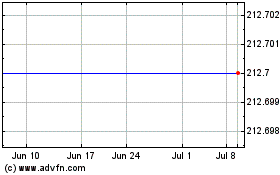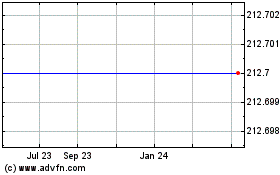Medicare prescription-drug benefit plan sponsors underestimated
the rebates they would receive from pharmaceutical manufacturers
when bidding for government contracts, resulting in higher
premiums, according to a federal inspector general's report this
week.
House Democrats responded Friday by asking for hearings on the
report, saying private health insurers that provide the drug
benefit gained "billions of dollars of profits at the expense of
taxpayers and Medicare beneficiaries."
Sponsors offering the prescription-drug benefit, known as
Medicare Part D, reported receiving $6.5 billion in drug
manufacturer rebates in 2008, according to a U.S. Department of
Health and Human Services Office of Inspector General report dated
Thursday.
While rebates can help reduce program costs, the health plan
sponsors underestimated rebates in 69% of their bids for the 2008
plan year, the OIG found.
Sponsors include health insurers, pharmacies and other
organizations offering the Medicare prescription-drug benefit.
"When sponsors underestimate rebates in their bids, beneficiary
premiums are higher than they otherwise would be. Further, some
sponsors reported large differences in rebates across their plans,"
according to the HHS OIG.
All six sponsors that the OIG selected for further review
"received rebates when they encouraged beneficiaries to use certain
drugs." The six sponsors represented more than 25% of all Part D
beneficiaries in 2008.
OIG didn't disclose the identities of the six plan sponsors
reviewed in the report.
Publicly traded companies sponsoring Part D plans include Aetna
Inc. (AET), Humana Inc. (HUM) WellPoint Inc. (WLP), UnitedHealth
Group Inc. (UNH), CIGNA Corp. (CI), CVS Caremark Corp. (CVS) and
Medco Health Solutions Inc. (MHS).
The benefit sponsors had complex relationships with their
pharmacy benefit managers, and sometimes the relationships lacked
transparency, the report found.
Some drug-benefit sponsors passed along to the program the fees
that their pharmacy benefit managers received from drug makers,
while others didn't.
"Because of the size of these rebates, it is vital that rebates
be reported accurately and that the government and beneficiaries
receive the full benefit of these rebates," the OIG said.
The OIG recommended that the Centers for Medicare and Medicaid
Services, which oversees Medicare programs, take steps to ensure
that plan sponsors more accurately reflect expected rebates in
their bids, require sponsors to use reasonable methods to allocate
rebates across plans, ensure that sponsors have sufficient audit
rights and access to rebate information, and make certain they
report the fees that pharmacy benefit managers collect from drug
makers.
CMS concurred with the first recommendation, regarding rebates,
and partly agreed with the recommendation about reporting fees that
PBMs receive from manufacturers, according to the OIG. It disagreed
with the other two suggestions.
Rep. Henry Waxman (D., Calif.) ranking member of the House
Energy and Commerce Committee, and ranking members of two
subcommittees sent a letter to Republican lawmakers asking for
hearings on the report. They said the OIG study "identifies
wasteful spending, potentially fraudulent conduct and
anticompetitive contracting related to the Medicare Part D drug
benefit."
Medicare pays for 75% of drug-benefit premiums, beneficiaries
for 25%, the lawmakers noted.
Industry trade group America's Health Insurance Plans was
reviewing the report, spokesman Robert Zirkelbach said Friday.
"The Part D program is highly competitive, so plans have an
incentive to offer the lowest bids and, therefore, the most
affordable premiums to attract beneficiaries," he said. As a
result, overall program costs are "far below original
projections--saving money for seniors and taxpayers," he said.
The government estimates the average premium this year is about
$30, only $1 more than in 2010, Zirkelbach said.
"It is also important to keep in mind that Part D bids are based
on projections of future costs, which are inherently uncertain. As
the report notes, Part D plans reconcile rebates estimated in their
bids with the amounts actually collected from pharmaceutical
manufacturers to ensure the taxpayer continues to share in any
additional savings the plan may be able to generate," Zirkelbach
said.
He was referring to a process in which CMS adjusts prescription
drug benefit payments based on sponsors' reports of actual
rebates.
Mark Merritt, president and Chief Executive of PBM industry
trade group Pharmaceutical Care Management Association, called Part
D one of the most sound federal programs and the only major one to
come in under budget every year, and agreed with CMS that there is
an appropriate amount of transparency between sponsors and PBMs.
The top sponsors are stand-alone PBMs or insurers with in-house
PBMs, so transparency for them isn't an issue, he said.
Plan sponsors "make responsible estimates that are
forward-looking and do their very best to make the right
estimates," he said, adding that they have incentives to offer the
lowest premiums possible.
On the web:
http://oig.hhs.gov/oei/reports/oei-02-08-00050.pdf
-By Dinah Wisenberg Brin, Dow Jones Newswires; 215-982-5582;
dinah.brin@dowjones.com
Aetna (NYSE:AET)
Historical Stock Chart
From May 2024 to Jun 2024

Aetna (NYSE:AET)
Historical Stock Chart
From Jun 2023 to Jun 2024
